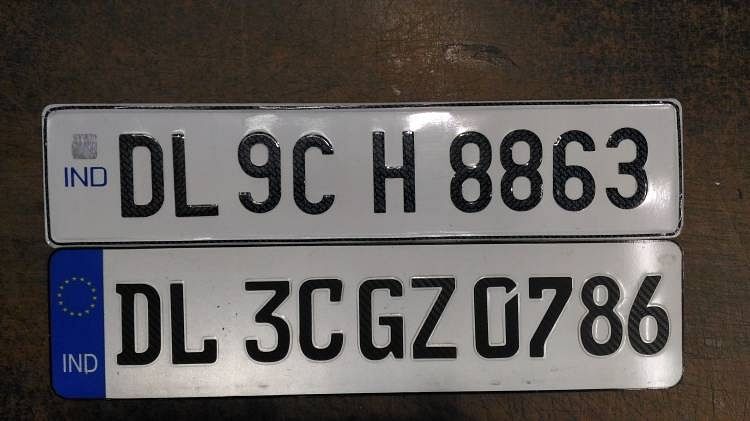
Our two-wheelers, tempo-trucks, et al, are randomly stopped for emission checks, even as a 40-year-old Bedford truck overloaded with bricks some four feet above the height of the vehicle, spewing dark diesel emissions, trundles by unchallenged. The current flavour of the season (for example in Karnataka) is renewal of registration, for which vehicles are flagged down randomly.
It is a no-brainer to think that the Regional Transport Offices (RTOs) could help our beleaguered and overworked traffic-constables big time if the year of manufacture of a vehicle were to be imprinted on the number plates, so that the constables could be suitably primed as to whom to flag down. For instance, it would be relatively futile to stop a two-year-old vehicle to inspect for emission compliance. But if it were over 10 years old, it should be a prime target.
But somehow, the simple idea has never struck our mandarins manning the RTOs. One could understand if the effort involved in introducing such a measure was mammoth and expensive. But is it?
Only recently, RTOs countrywide introduced a new number plate format, with a blue strip to the left of the plate, where there is a square with some bull’s-eye-like markings inside surrounded by a dozen stars (with some variants) aping the Euro plates, the whole thing underscored by the label INDIA or IND, as if but for such an enlightening legend, we would be in serious doubt as to the nationality of our Suzuki or Indica cars or Tata or Ashok Leyland trucks plying our roads. Or, as if the vehicular traffic jamming our streets from neighbouring countries or vice-versa was so dense that we needed to clearly distinguish Indian vehicles from those of other nationalities, a la, vehicles plying across the European Union.
On the other hand, the year of registration or manufacture within a small circle, like for 2005 or for 2014, etc., would have been a most useful introduction, whether for the purpose of renewal of registration of old vehicles, or for checking old vehicles for emissions.
The usefulness of the year of manufacture or registration goes even further. Suppose a particular model of a car made in a particular year (or years) is under recall for some brake or steering defect, which can be a serious threat to the drivers as well as others. It would make sense if the constables could readily see the year of manufacture/ registration on the vehicles to check if they had undergone the necessary corrections, lest the vehicle be potentially dangerous. The year-legend could help narrow down hit-and-run vehicles, too. One can think of other benefits of the year-legend on the number plates.
So, why do our RTOs not think of it? Or if they do, what prevents the implementation?
It is unlikely that the RTO authorities are not aware of the standard practice of the year-legend on number plates in other countries with functioning systems, like in Europe or the US, etc. Nor does this cost anything to the exchequer. What then could be the rub?
Why this apathy?
Could it be plain and simple apathy towards their work and responsibility, because they get their salaries in any case and their jobs or their benefits are assured for life? Or, is it that convenience of constables or even the citizens is no skin of the RTOs’ nose? Why are our RTO authorities focused on nothing but corruption and corruption alone?
Should the RTOs not be engaged seriously in ensuring that every single road in the country is painted with lane-dividers, appropriate signage, zebra crossings and such? Should they not ensure that every crossing is scientifically designed, instead of depending on good old jugaad where often five, six or even seven roads, streets or lanes criss-cross? Should they not concentrate on designing systems which would ensure vehicles do not ply in the wrong direction? Should they not be enforcing suitable road dividers with smooth, rather than sharp, edges so that accident victims will be less hurt in case of a fall?
Should they not ensure that while works are in progress, bad passages are made decent and passable? Should they not be engaged in ensuring that manholes do not dip or protrude six inches below or above the road causing even more accidents than our roads and chaotic traffic on their own are capable of?
Should they not be concerned that our speed-breakers are more often than not our bone-breakers? Should they not be engaged in pushing for every single road-junction in a state to have traffic signals; or at least yellow blinkers? Should they not be nudging schools into traffic education or awareness campaigns? Should they not reflect why Aadhaar card should be acceptable for bank accounts, passports or cell-phones, but not for purchase of a measly two-wheeler?
One is not even complaining that they do not ensure any of the above. One is only complaining that they do not even seem to care that these are things they ought to be looking at in return for the life-time tax (often multiple times) that they collect with great enthusiasm. This writer had to pay a fine of Rs 7,000-odd in July 2014 because he was challaned on the morning following his move to Bengaluru because his car carried an AP registration! The proof of the previous day’s toll receipts in defence were to no avail!
Whatever happened to the one-month grace period to effect such transfers of registrations? Why this harassment of a citizen in his own country? Why the multiple claim of “life-time taxes” without ever refunding the previous life-time tax paid? We are now told the RTOs are working on it and we are to live by the hope that this state loot of a citizen will hopefully cease 70 years after Independence.
Sadly, our RTOs reflect India in miniature, where the administration exists, not for the benefit of the citizen, but for their own grotesquely distorted ends.
(Raghunathan is an academic and author)